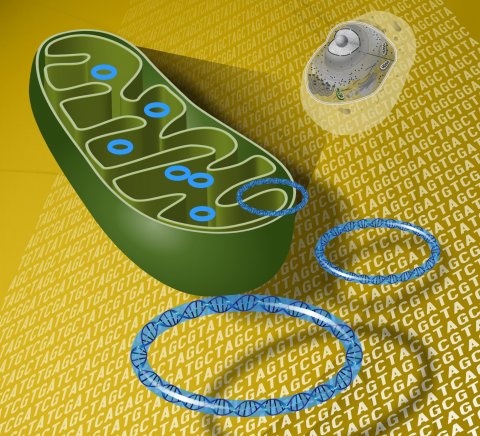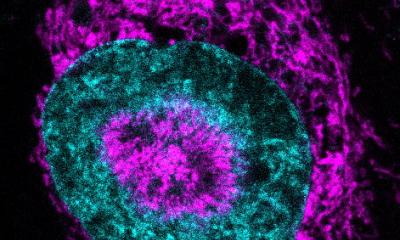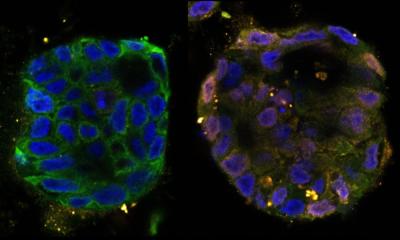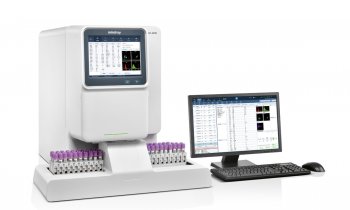News • Mitochondria research
Colorectal cancer: Mutations in overlooked DNA could have huge impact on survival
DNA errors in the cell’s energy ‘factories’ increases the chances of survival for people with bowel cancer, also known as colorectal cancer, according to a new study.

Image source: National Human Genome Research Institute (NHGRI) from Bethesda, MD, USA, Mitochondrial DNA (27249944414), CC BY 2.0
Studying how DNA errors (mutations) can drive cancer development, as well as help it adapt and evolve, has been a key focus of cancer research. But much of that focus has been on DNA found in the cell’s nucleus. Experts say the errors found in DNA outside the nucleus, in structures called mitochondria, have been “overlooked for decades”, but could have a profound effect on survival.
The study was published in the journal Nature Metabolism.
The researchers hope that in the future, doctors could use this information to identify patients with more aggressive forms of bowel cancer so they can receive the most effective treatments. Michelle Mitchell, chief executive of Cancer Research UK, said: “This work highlights just how much more there is to discover about the inner workings of cancer, and all those breakthroughs for people with cancer we have yet to unlock.”
This discovery could have a huge impact on patient care, with potential for changes to suggested treatments and a patient’s outlook based upon the mitochondrial DNA status of their cancer
Payam Gammage
Whilst most of our DNA is wrapped up at the centre of our cells in the nucleus, we also have some in our mitochondria, small structures found in our cells that help us turn carbon fuels, such as sugar, into energy. This DNA is also prone to errors (mutations). Mitochondrial DNA mutations have been found in cancer cells before, but there has been little research into what they do or whether they have any effect on treatment response or how the cancer will progress. Dr Payam Gammage, co-lead author and group leader at the Cancer Research UK Beatson Institute, said the study shines a light on the impact of mitochondrial DNA mutations in cancer, which have been overlooked for decades.
To answer these questions, researchers at the Cancer Research UK Beatson Institute in Glasgow collaborated with the Memorial Sloan Kettering Cancer Center in New York to collate and analyse data from the largest published dataset of tumour samples that include mitochondrial genome data and the corresponding clinical outcomes of the patients. By analysing data from 344 patients with bowel cancer, the team could match groups of mutations to the likelihood of survival. They found that, after controlling for other variables that affect cancer risk like age, the presence of mitochondrial mutations was associated with 57 to 93% decreased risk of death from bowel cancer, depending on the type of mitochondrial DNA mutation. “This discovery could have a huge impact on patient care, with potential for changes to suggested treatments and a patient’s outlook based upon the mitochondrial DNA status of their cancer. However, further research will be necessary to move these discoveries from the lab to the clinic,” said Gammage. “Incredible things can be achieved through research, and the gains are even greater when we collaborate with world class global institutes like Memorial Sloan Kettering Cancer Center,” added Mitchell.
Recommended article

Article • A more integrative approach to digital pathology
imCMS: The door to simple, cheap, reliable bio-stratification
Bringing molecular and digital pathology closer together through a more integrative approach can lead to clear advantages for diagnostic and research workflows. During the recent Digital Pathology and AI Congress (London), Professor Viktor Koelzer explored the benefits and paid particular attention to colorectal cancer (CRC).
The team also wanted to know how common mitochondrial mutations were in cancer more broadly. They used cutting-edge genetic techniques to look at existing data from over 10,000 tumour samples across 23 cancer types to search for mitochondrial mutations that were frequently repeated. They found that mitochondrial mutations were present in almost 6 in 10 tumour samples, with 25 out of the 30 most commonly mutated genes across cancers being present in the mitochondrial genome.
These results indicate that mitochondrial mutations could play a role in survival beyond bowel cancer. Further research is needed to understand the wider implications of mitochondrial mutations in different cancers, and to delve into the biological underpinnings behind it. Dr Ed Reznik, co-lead author based at Memorial Sloan Kettering Cancer Center, said: “Using data hiding in plain sight, we have shown that a critical piece of the cell’s machinery to make energy is quite often broken in cancers. It now begs the question of how these mutations within mitochondrial DNA might be exploited as drug targets.”
Source: Cancer Research UK
09.04.2021











